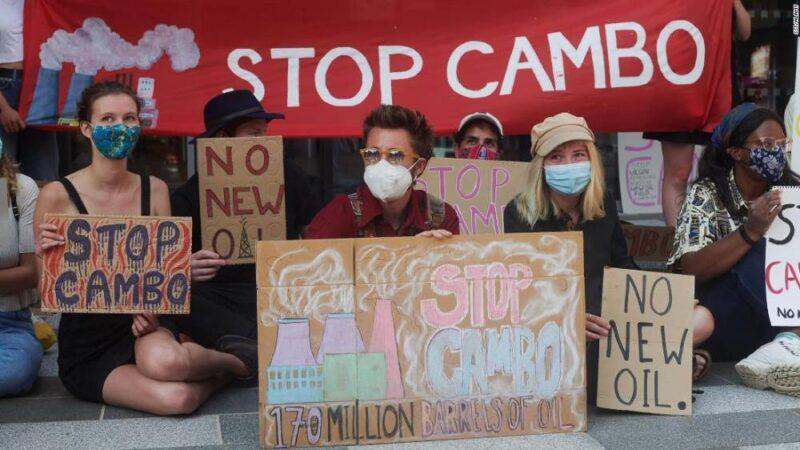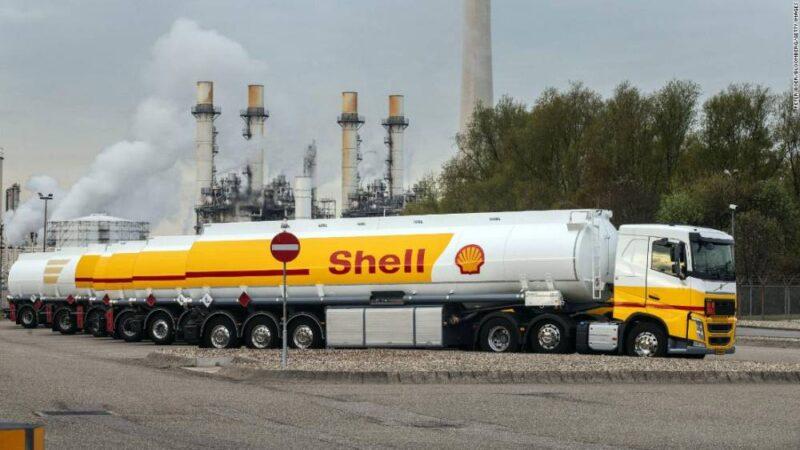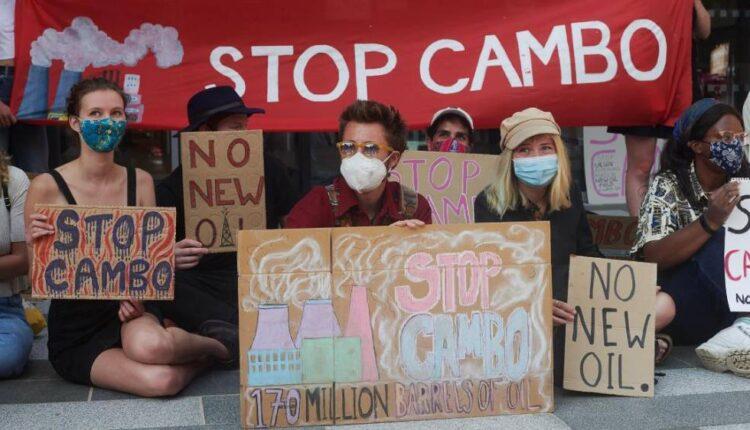London (CNN Business)The UK government has been warned to stop a massive North Sea oil project or see its hopes of becoming a climate leader dashed as the country prepares to host a crucial environmental summit later this year.
In the coming weeks, Britain’s oil regulator could decide whether to green-light the Cambo development near the Shetland Islands, which co-owners Shell (RDSA) and Blackstone-backed Siccar Point Energy expect to produce 164 million barrels of crude during the first phase of development.
We will know if politicians are listening if the UK government, as hosts of COP who aspire to lead on climate, call time and put a stop to Cambo."
But environmental groups and other activists are furious. They claim that approving the development would damage the environment and undermine claims by the UK government that it’s taking bold action ahead of November’s 26th UN Climate Change Conference, or COP26, in Glasgow.
“We will know if politicians are listening if the UK government, as hosts of COP who aspire to lead on climate, call time and put a stop to Cambo,” said Tessa Khan, a climate lawyer who leads the advocacy group Uplift.
The political fight underscores the challenges facing governments and businesses as they strive to meet net-zero emissions goals aimed at limiting warming to 1.5 degrees Celsius, which is essential to maintaining a livable planet. Read MoreOn Monday, the United Nations’ Intergovernmental Panel on Climate Change warned the world has rapidly warmed 1.1 degrees Celsius higher than pre-industrial era levels, and is now careening toward 1.5 degrees. Yet the world remains reliant on oil and gas, and companies like Shell are working to provide it. To reach net-zero emissions by 2050, however, no new oil or gas fields can be approved for development, the International Energy Agency warned earlier this year.”If we reduce the consumption of oil in line with what is needed to reach [the 2050] targets, we will not need to invest in new oil or gas exploration or new coal mining. Very clear,” Fatih Birol, the IEA’s executive director, said in a recent interview on Cambo with the UK’s Channel 4. The UK government, he added, should choose to be an “inspiration for the rest of the world.”
The Cambo oilfield
The Cambo oilfield is a key project for Shell, which holds a 30% stake, and Siccar Point, which controls 70% of the venture.”It’ll be important for both of them because there are so few developments now [in the North Sea],” said Alexander Kemp, a professor of petroleum economics at the University of Aberdeen.Discovered in 2002, the field could contain over 800 million barrels of heavy crude. Deepwater drilling is expected to start in 2022, with oil production kicking off in 2025 and running until 2050.”It’s a significant size field by today’s standards,” said Kemp, noting that a more typical development would yield about 20 million barrels, not 164 million. But the project has stoked the ire of a coalition of environmental advocates, who are ramping up political pressure by highlighting the optics of approving the development so close to COP26. The oil produced will have the same climate footprint as running about 18 coal-fired power stations for a year, Uplift has calculated.”The proposed new Cambo oilfield is a clear climate contradiction,” Jamie Livingstone, head of Oxfam Scotland, said in a statement this month. “If the UK government is to be a credible broker for a deal that can stop the planet overheating when it hosts the COP26 climate talks in November it must intervene in the Cambo case.”The IEA’s net-zero roadmap published in May is another flash point. The report plainly states that as of 2021, no new oil and gas fields can be developed in order to reach climate targets. Uplift’s Khan said this is “the first major test” since the warning was issued.
A looming decision
The UK Oil and Gas Authority (OGA) is expected to imminently decide whether to allow the development to proceed.Prime Minister Boris Johnson told local media late last week that the choice is up to the regulator and “no contracts should be ripped up.” Greenpeace has said if the OGA moves ahead, it could sue. The activist group takes particular issue with the government’s announcement that it will require new “climate compatibility checkpoints” on future oil and gas licensing rounds to make sure they’re in line with the United Kingdom’s pledge to reach net zero emissions by 2050. That doesn’t apply to Cambo, since a license was already issued in 2001 when exploration of the area began. Greenpeace has called this a deliberate “loophole.”Alok Sharma, the lawmaker appointed by the UK government to lead COP26, did not directly address whether North Sea oil production contradicts UK climate goals when asked by reporters Monday, saying that the government was “going to be very rigorously applying a climate compatibility check” for “future” oil and gas licenses.

Cambo oilfield protestors rally outside a UK government building in Edinburgh, Scotland on July 19, 2021. There’s reason to believe the OGA will push forward with the project, even if it generates backlash.The agency has emphasized that even under net-zero plans, oil and gas will remain crucial sources of energy for the country, and that it’s closely monitoring emissions for all projects to make sure they align with the 2050 goal.”Oil and gas still make up around three quarters of the UK’s energy consumption,” Chairman Tim Eggar wrote in the agency’s latest annual report. “They are forecast to be needed now and into the future; not just for heating, transport and power generation, but also as a feedstock for manufacturing other materials such as chemicals, medicines and more.”
Shell and Siccar Point’s role
This position is echoed by those in the oil industry who believe that based on the United Kingdom’s ongoing energy requirements, the focus on Cambo is overdone.”Fields like Cambo meet the UK’s energy needs, and producing it here means we can reduce emissions associated with production as much as possible,” said Deirdre Michie, CEO of industry group Oil & Gas UK. “A premature ending of domestic production would mean we simply need to import more of it from other countries, at great expense, while losing all control of the environmental standards for how it was produced.”In response to questions from CNN Business, Siccar Point Energy CEO Jonathan Roger said that Cambo would directly create 1,000 jobs in the United Kingdom, and that the oilfield will be built using “modern, low-emission equipment and manufacturing processes and be electrification ready, with the potential to be powered by renewable energy when that’s feasible.”Shell emphasized that its oil production peaked in 2019 and is expected to continue to decline until 2030.

Shell CEO: We will cut emissions faster but the world needs to use less oil”We’re already investing billions of dollars in low-carbon energy,” a company spokesperson said. “But the world will still need oil and gas for decades to come in sectors that can’t be easily decarbonized. Targeted investment in oil and gas will ensure we can supply the energy people will still rely on, while funding the rapid growth of our low-carbon businesses.”But like the UK government, industry players are walking a tightrope.There are, of course, business considerations at play. The United Kingdom is one of nine core markets that Shell has identified for energy exploration and production. In a report to investors, the Anglo-Dutch company estimated average investment returns of 20% to 25% for similar projects across its portfolio. Siccar Point said investment in the Cambo project will total about £1.9 billion ($2.6 billion) and £140 million ($194 million) has already been put up. It declined to comment on expected returns.Meanwhile, investors are asking more from oil companies as they increasingly weigh environmental and social concerns — as are the courts.In May, a Dutch judge ordered Shell to slash its CO2 emissions by 45% by 2030 from 2019 levels in a landmark climate decision. That would require the company, which is currently targeting a 45% reduction in carbon intensity by 2035, to speed up its transition plan.
Shell is appealing the ruling, which it says risks shifting demand to suppliers that are less concerned about reducing their emissions impact. But the Cambo debate reveals the firm’s tough road ahead. On one hand, Shell wants to drum up confidence in plans to make its business greener. And yet, at its core, it’s still a corporation that produces oil and gas. That’s not going to change anytime soon.
Source: edition.cnn.com

